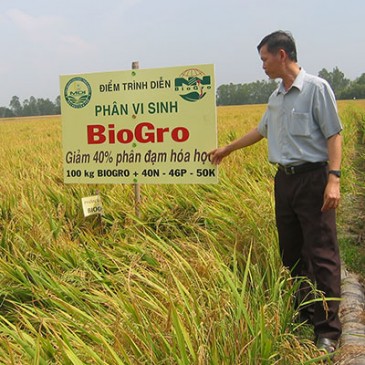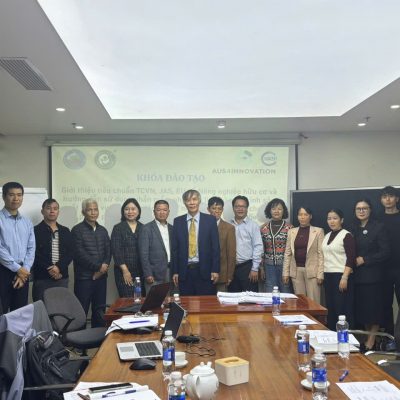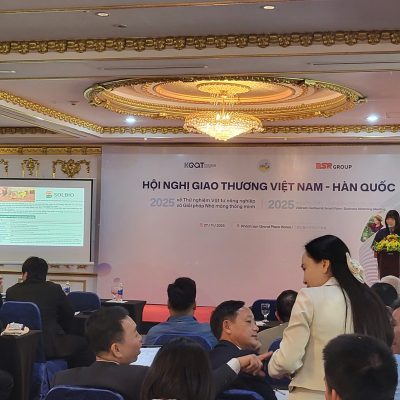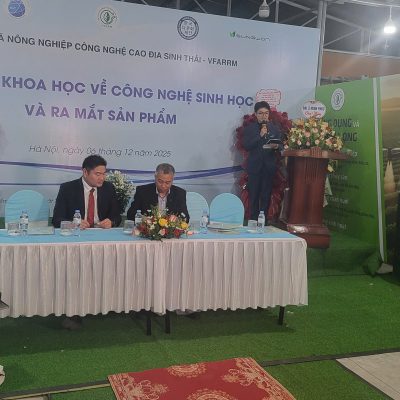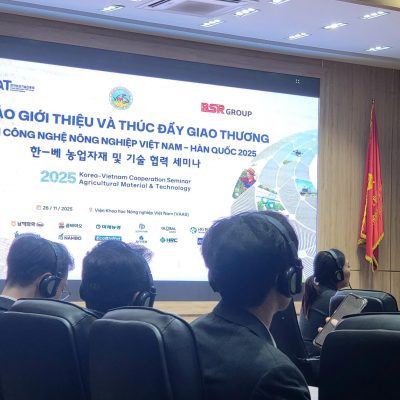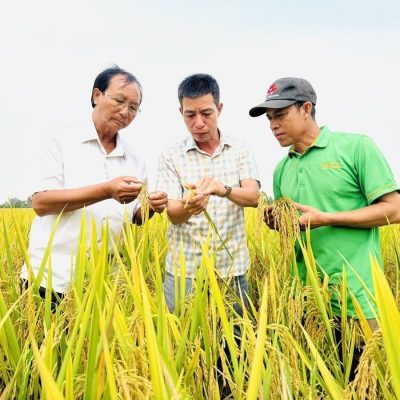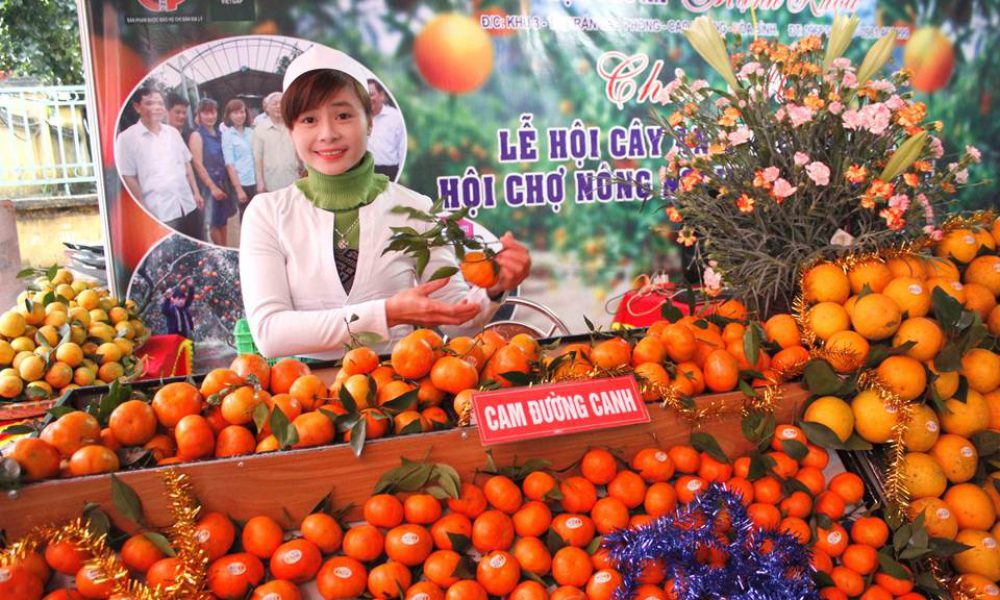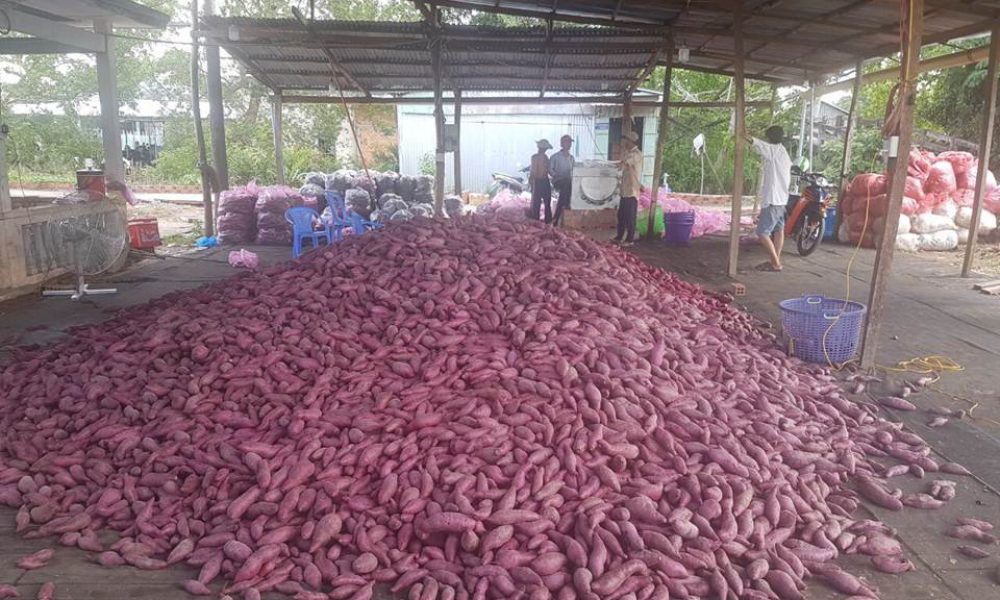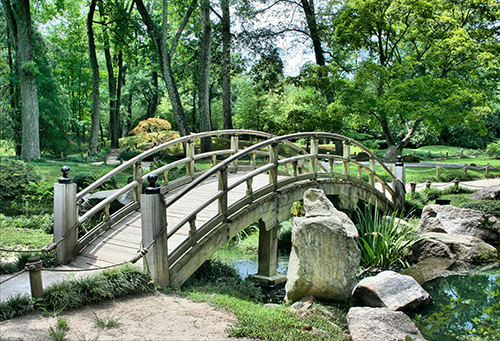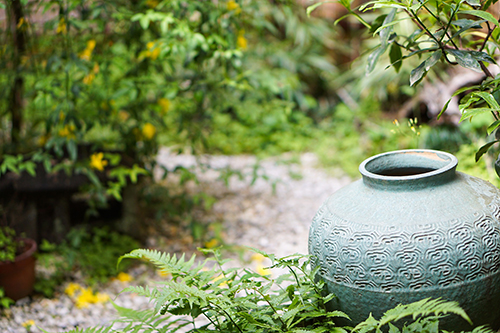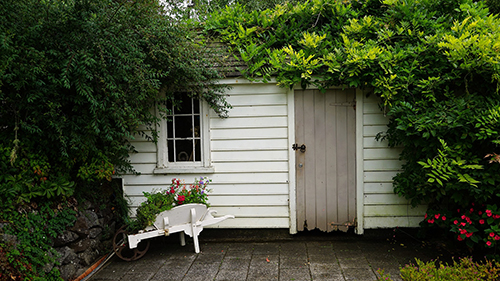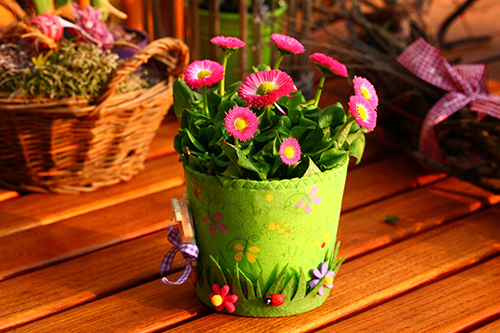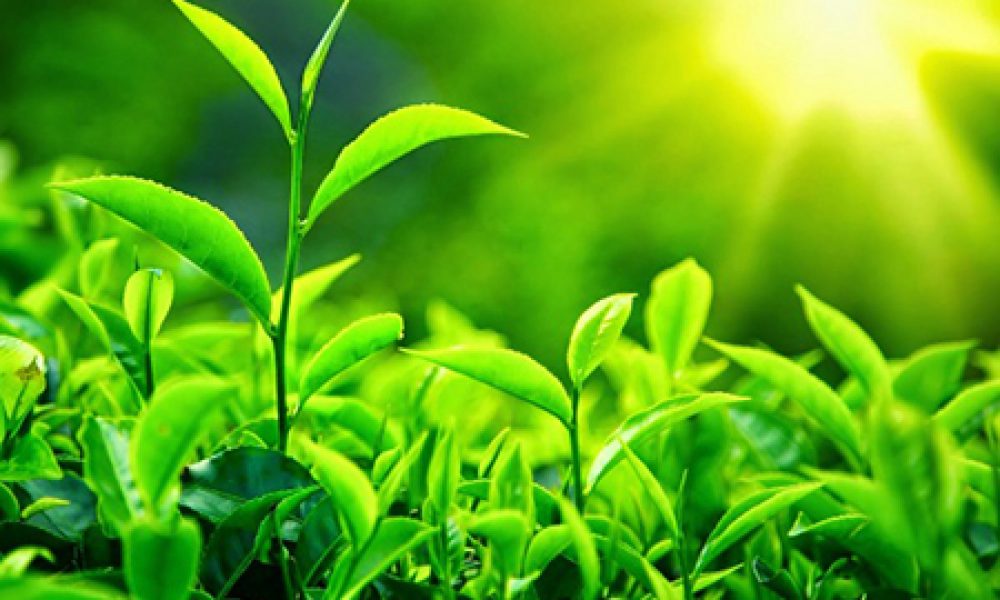
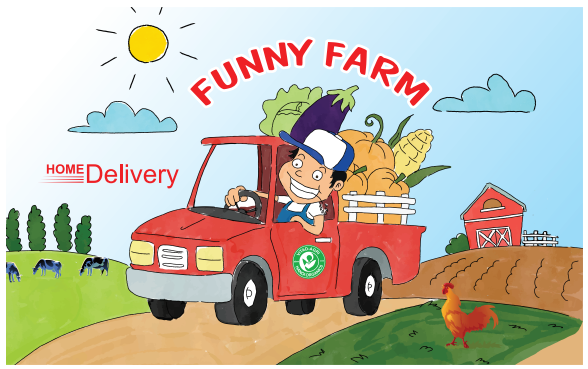
Cẩm nang ICS Funny Farm
GUIDANCE ON THE INTERNAL CONTROL SYSTEM UNDER THE PROJECT FUNNY FARM (ICS)
This manual was approved by Funny Farm Management on May 2019.
And will take effect from the date of month 2019.
I. INTRODUCTION TO SUMMARY OF ORGANIC AGRICULTURE
Organic farming is a uniformly managed cultivation that protects and promotes the health of agricultural ecosystems including biodiversity, biological cycles and biological productivity. Organic farming is applied in crop and animal production to ensure a sustainable ecosystem, safe food, good nutrition, Caring for animals and social justice.
1.A brief history of organic farming
It is hard to say when organic agriculture came into being The concept of "organic" was a choice of other farming methods that were revealed before the invention of synthetic agrochemicals.. It has taken place over the years 1920-1940, from the initiative of some pioneers trying to improve traditional farming systems with specific methods of organic farming. At that time, The improvement is the new methods focusing on soil nutrient based humus and towards ecological balance within the farm..
When the introduction of high-yielding varieties comes together with the use of powerful agricultural chemicals and mechanization (Green Revolutionary Agriculture) become popular, Some have objected to this new argument and organic farming practices such as composting, improve crop rotation, or plant painted green manure. The gap between organic farming and conventional agriculture ("chemistry") so the bigger.
Negative impact on the health and environment of the Green Revolution over the years 1970 and 1980 becoming more and more obvious, Awareness of both farmers and consumers on the issue of "organic" increased slowly. Related farming systems such as "Permanent agriculture" or "Low external input agriculture" (READ – Low External Input Agriculture) has been expanded.
Only until the years 1990, The experience of organic farming is rapidly increasing, The number of food scandals and environmental disasters has encouraged and increased consumer awareness and supportive policies in some countries.. At the same time, A series of new and improved organic techniques (especially the management of pests by biological methods) and more efficient farming arrangements have been developed.
However, Organic agriculture only forms a small part of the world's agriculture, Even formed with a small percentage of the rural farming mechanism is very few. State support for research activities, Technical transfer or marketing in organic farming is still very low in most countries. Though, Organic farming is now promising fast growth throughout the world.
2. Organic agriculture in Vietnam
Vietnam is a country with a long history of agricultural production and organic farming methods. Right from the year 90, A number of non-governmental organizations have come to Vietnam to study, investing in organic production projects and helping farmers understand organic farming. On that basis, some guidelines, Organic farming methods and organic production models have gradually been formed and developed in Vietnam. According to the Vietnam Association of Organic Agriculture, to year 2015 our country has about 76.666 ha under organic farming.
Although newly developed in scale and scope is not large, Some businesses have invested in organic agriculture, Proactively asymptotic to apply international standards. Some products have been certified as tea, Spice, essential oil and exported to many countries like the US, Europe (Ecolink-Ecomart produces Shan Tuyet tea, Organic Dalat, Vien Phu Green farm, TH True Milk cow (1.000 with), Vinamilk (500 with), TH Herbals medicinal herbs, Humat TE organic fertilizer reaches USDA Organic ...).
About the production, now, organic agriculture production under Participation Guarantee System (referred to as PGS – Participatory Guarantee Systems) by the International Federation of Organic Agricultural Movements (IFOAM – International Federation of Organic Agriculture Movements) construction and promulgation are also shaping development. In some localities, Associate Professor of Organic Vegetables Thanh Xuan, Paint salaries, Xin Lạc, Hoi An ... with a scale of approx 40-50 he has, gathered the participation of small farmers, with the support of PGS Vietnam under the Vietnam Association of Organic Agriculture, the involvement of a number of businesses, Shop that sells organic products, local and non-governmental organizations.
About the market, now, The market for organic agricultural products is growing very fast, about 10-15% / year. IFOAM statistics for the year 2014 shows, 10 The country has the largest market with value 72 billion USD is US 27 Billion , Virtue 7,9 Billion, France 4,8 Billion, China 3,7 billion and Canadian countries, Brother, Italy, Belgium, Sweden, Magnetic shirt 1-2,5 billion USD. Organic cultivated land area 11 million ha year 1999 up 43,7 million ha in the year 2014 (Source: VOAA). As a major exporter of agricultural products, Vietnam needs to quickly grasp this trend of the world agricultural market.
Month 8/2018, Vietnam has issued Decree 109/2018 / ND-CP, defined organic agriculture as ”Organic agriculture is a production system that protects land resources, ecosystem and human health, based on ecological cycles, Biodiversity adapts to natural conditions, Do not use factors that cause negative impacts on the ecological environment; is a combination of traditional techniques and scientific advances to benefit the common environment, create fair relationships and balanced life for all objects in the ecosystem”
3. Principles of organic agricultural production (according to the thing 4 of Decree 109/2018 / ND-CP)
– Manage resources (cover land, country, air) following systematic and ecological principles in the long-term vision.
– Do not use supplies that are synthetic chemicals at all stages of the production chain, Avoid human and environmental exposure to toxic chemicals, reduce pollution in production areas and surroundings.
– Do not use genetic engineering technology, Radiation and other technologies are harmful to organic production.
– Treat animals, plants responsibly and improve their natural health.
– Organic products must be certified by a third party according to national standards (TCVN) about organic agriculture or international standards, regional standards, Foreign standards are applied in the production of organic products.
4. Why should organic farming?
The current, The common practice of using a lot of chemicals has made the soil barren, Pests increasingly difficult to control, Rivers and lakes are polluted by chemicals and nutrients, which are washed away from the soil, leading to harm to the health of pets as well as humans.
Organic farming has just created quality products, high value, at the same time helping to make the soil fertile, Water source is protected, The environment is clean, improve the health of the entire flora and fauna ecosystem, including humans.
5. Some basic solutions for organic farming
a / General principles
The most important thing in organic farming is how to preserve and improve soil fertility. In order to nourish the farmland, it is possible to rotate crops, plant legumes; Plant and use green manure, Use compost and composted agricultural by-products, Recycling; properly cultivate the soil, right time, minimize the imbalance of the soil. Along with compost, know how to encourage soil microorganisms to function and protect them from harm from chemical pesticides. Cover the ground (incubation root) and planting cover crops are the measures used among other measures to prevent erosion.
Conventional farming using chemicals often focuses primarily on achieving maximum productivity with a simple notion: “Crop yields are increased due to increased or reduced nutrient inputs due to pests and diseases and weeds, so they need to be destroyed with chemicals”. However, Organic farming is a comprehensive integrated farming method that both achieves the goal of producing high quality goods while preserving the natural nutrients in the soil., ensure clean water and biodiversity. Why so? It is the art of applying the principles, The ecosystem process happens naturally along with the application of scientific advances to practice organic farming.
b / Crop diversity in the farm / organic production site
In organic production farms, rotation or intercropping of some crops, including large trees, is recommended. Animals are part of the farm's production system. This diversity allows not only maximum utilization of resources but also economic security in the event of a deep, disease attacks or low market prices for certain crops.
c / Biological struggle in farms / organic production places
Organic farming farmers try to keep the worm, disease at a level that does not cause economic damage. Focus primarily on supporting healthy plants and increasing crop tolerance. These beneficial insects are encouraged by creating habitat and feeding them. If deep, The disease reaches a dangerous level, Natural enemies and prepared herbs will be used.
d/ Preserving the ecological of farms / production areas
The use of agrochemicals in cultivation is creating serious damage to the environment and ecology of the production areas, and cause problems such as salinity increases, poor soil nutrition, The soil is compacted, erode, reduce biodiversity in the field, depletion of groundwater levels,…
Current environmental issues threaten the sustainability of communities and agricultural production. Ecological conservation of production areas by the termination of use of agrochemicals, especially pesticides and chemical fertilizers, can reverse these negative effects. Conserving the surrounding environment and the existing local vegetation in the production area will also benefit biodiversity improvement..
e / Diversify agricultural ecosystems more
In addition to preserving ecology, Organic agricultural principles require farmers to strive to improve soil ecological and ecological balance. These principles make a clear difference between organic agriculture and chemical free agriculture or "safe agriculture.". The main measure to improve the ecology of the production area is to improve the soil with organic materials and increase biodiversity..
In an organic farming system, land is a key factor. Making the soil more fertile allows plants to obtain adequate and balanced nutrition. It makes plants healthier to resist pests and eliminates the need for farmers to rely only on pesticides. Besides that, Organic produce products that taste good, Good storage and organic production can increase crop yields in a more sustainable way than chemical-based farming..
In addition to improving soil nutrition, Increasing field biodiversity is another key element of sustainable farm ecology. This is because diverse organisms living side by side will facilitate the ecological balance to thrive. There are many ways to increase biodiversity such as intercropping, crop rotation, grow large trees or provide natural areas within or around the farm / production area.
g / Working with natural cycles
The principles of organic agriculture are determined based on a sustainable farming that conforms to the laws of nature, such as climatic conditions, nutrition cycle, and the dynamics of insect populations. Sustainable agriculture is not about production to try to fight nature, but try to learn from nature and adapt farming systems to the methods of nature.
Key natural processes for organic agriculture include: Nutrition cycle (especially the nitrogen and carbon cycle), hydrolysis cycle, Endorsement conditions, the light, ecological relationship and balance (In the field and food chain).
In different places of the world, Natural conditions and ecological conditions also vary. Farmers engaged in organic agriculture must learn from local situations and conditions by observing themselves, study, investigations and research as part of the learning process. Learn through this process in their own field, Farmers can benefit most from local natural and ecological processes.
h / Preventing pollution from outside
Although organic agriculture banned the use of synthetic chemicals in production, but the surroundings of organic farming may have been contaminated by pollution and put organic production in the position of using unwanted remnants., both in water as well as in the air or in the soil itself. So, Organic farmers must try to prevent external contamination into their production areas. Prevention can create boundaries around the place of production or establish a buffer zone. However, It is very difficult to eliminate all pollution from the pollutant source present everywhere in the environment. For example, an organic farm may have to share the same water source as the regular farm and it means that the organic production is more or less contaminated with chemicals.. So, Organic farmers should try as much as possible to prevent contamination but at the same time never require organic production to fully escape contamination..
Besides preventing contamination from outside, Organic farming also stipulates that farmers must limit or prevent contamination that can occur from the organic production of the farm.. For example, a sewerage system must be built to treat kitchen waste and sewage before it is discharged outside the production farm.. Besides, Contaminated materials may also be banned from use as containers for organic products.
i / Self-supply of production materials
In organic agriculture, Farmers have to use some production materials like organic fertilizer, seed etc.. Organic agriculture has a principle that farmers should make these materials to their fullest extent within their own farms.. However, in the case of farmers not being able to produce inputs by themselves, (for example when there is not enough area or high investment requirements to produce the materials needed for production) Farmers can buy or collect materials outside their production areas, But these materials should be available in the local area.

Image 1: ACT certification
II. STRUCTURE, ORGANIZATION OF INTERNAL SUPERVISION SYSTEM
1.Background information
Vietnam Application of Agricultural Technology and Development - VITAD – AGRI is an economic and scientific organization based in Hanoi.
Forerunner of VITAD Institute – AGRI is the Hanoi Organics organization born in May 9/1999 pioneer in organic agriculture and is the first organization in Vietnam to achieve international certification (ACT – Organic Agriculture Certification Thailand) for organic production system of agricultural products according to IFOAM standards (International Federation of Organic Agricultural Movements).
At that time, Hanoi Organics was Funny Farm, operating as a non-government organization (NGO), have helped a number of agricultural areas throughout the country, restructuring vegetable crops, fruit, organic farming, medicinal plants, Tea tree… to cultivate organic farming methods. These production areas are located in "Community agriculture assistance program - Funny Farm". With this support program, producers comply with organic farming methods and consumers ensure the correct value of products.. This program has kept rural farming efficient, improve living environment, Ensure human health and create safe products, No chemicals.
– Pursuant to Decree No. 109/2018 / ND-CP dated 29/08/2018 of the Prime Minister on Organic Agriculture – has been in effect since 15/10/2018.
– Pursuant to the Vietnam Standards Ministry 11041 about organic agriculture.
– Based on the science and technology registration certificate No. A-1748 issued by the Ministry of Science and Technology 28/4/2017.
The begin of the year 2019 "Community agriculture assistance program - Funny Farm" set up an internal control and inspection system (ICS – Internal Control System). Which includes:
– All farmer households (producer) Want to sell their products under the label of Funny Farm.
– Willing to welcome farmers (producer) Currently not selling products through Funny Farm but would like to have an outside supervision during their preparation period before making market access through Funny Farm..
2. Organizational chart |

3. Operating principles in the Funny Farm network
– With the maximum conditions and always give priority to the producers who are officially members of Funny Farm. Protection of legitimate rights and interests of members. Share and receive more knowledge about organic agriculture. Exchange ideas in a community of like-minded people and an opportunity to develop partnerships.
– To be sponsored, supervised by the internal control inspection system (ICS) of a professional organization pioneering organic agriculture.
– Producers participating in Funny Farm receive more information, knowledge at specialized training courses: corporate governance, Production Management, training classes on financial and accounting profession, marketing…
– Get access to events, Domestic and foreign activities of Funny Farm. With the maximum conditions and always give priority to the producers who are officially members of Funny Farm. Protection of legitimate rights and interests of members.
– Is traded, advertise, Distribute products through Funny Farm's channels.
– Positioning on the website: Official manufacturers, if eligible, will have their logo published, Business information on the Funny Farm website. Each member has an account to log in to share information regularly with decentralization for members only on the Website of Funny Farm.
 4. Responsibilities of the internal inspection system (ICS)
4. Responsibilities of the internal inspection system (ICS)
The coordinator is responsible for the internal control system of Funny Farm's organic project. Director of Funny Farm, the executive director and an external member will be members of the Committee approving the internal control system. An inspector team of the internal control system includes technical staff of this internal control system.
The latest list of members of the internal control system is shown in the appendix 1.
5. Describe the content of activity monitoring and the approval process
5.1 Registration
a / Standard requirements for units wishing to apply for organic projects.
In principle, All farmers who are willing to follow the project's organic farming standards and follow the organic project's rules become members of the organic project.. However, large farmer households (with the above cultivated area 1 hectares) or farmers located in areas that are difficult to access for routine audits will not be included in the project.. All farmers who are willing to become a project members need to pay to participate in the project. The latest fees and collection schedule are shown in the appendix 2.
b / Description of registration and paper requirements (Application form for example) for organic projects
All farmers who apply for membership in the organic project will receive this handbook, current organic standards and a set of applications. Farmers need to fill out and sign "Funny farm's organic agriculture project participation agreement" (model FM11). They also need to fill out and sign a "farming history." (model FM12), "organic farming planning" form (model FM13) and provide the project with a "description of cultivated area" map as well as an "detailed diagram" of each plot of organic farming.. Farmers also need to register the names of all types of organic produce in a farming investment form (model FM14). Types of FM samples from 11-14 is attached in the appendix 3.
In case of necessity, Funny farm technical staff will assist the farmers in filling out / filling out these forms and draw the required diagrams..
c / Refine the application (based on documentation) and how to approve your application and the annual screening process
After receiving the application form of the farmer household, Funny farm executives will send a letter notifying them of the receipt of their application. The CEO will then screen the applications the project receives. If there are incomplete applications, The executive director will return the applicant or request the Funny farm technician to visit the farmer directly to assist this household in completing the application.. In case the CEO finds that the registration information is complete, then the Organic Project Approval Committee will take that into consideration. When the application was accepted, The executive director will notify the applicant of the Commission's decision.
5.2. Survey of internal control
a / Procedures for assigning an internal control survey
Funny farm's CEO is responsible for choosing an inspector and assigning the task to that person. After the auditor has agreed with the assigned task, Funny farm will notify the farmer household in writing about the identity of the inspector and the time for the inspection.. Along with this text, Funny farm will also inform the farm household of the farmer's right to refuse auditors, but the farmer must provide a satisfactory reason why the inspector may have a conflict of interest. It is useful for farmer households and this may be subject to objective testing. The reasons are not convincing enough (for example if the provinces of inspectors for example) will not be approved. Within one week after receiving notice of the inspection, farmer households (or group) need to inform Funny farm executives whether they agree or disagree with the testing.
If the parties agree, The executive director will send to the inspector the necessary documents, including written instructions on what to do when visiting the farm inspection.. The inspector is the person in charge of contacting the farmer's appointment with the farmer (or group).
For abnormal inspection, Funny farm's executive director will specify the tasks for the inspection trip. If the inspection trip is decided without prior notice, the inspector will conduct a household visit (or group) Farmers without prior notice.
b / Procedures for selection and approval of internal control experts
All auditors working for Funny farm's internal control system will have to complete a Funny farm inspector training course and all subsequent activities organized by Funny farm.. All inspectors must sign contracts with Funny farm. In this contract, the inspectors need to specify the benefits, His concerns may affect the objectivity of the test.
The following criteria will be applied for consideration when assigning an internal control visit:
– The capabilities and experience of inspectors
– History of accreditation: Within a year, different inspectors will take turns testing the same group / farmer.
– Inspectors must not have a conflict of interest with farmer households (or group) will be verified: Examples of conflicts of interest include:
+ Inspectors are responsible for a project that involves farmer households (or group) about to be tested.
+ Inspectors who are family members of a farmer will be inspected.
A reasonable way of assigning an auditor to that inspector is to perform the task in another province or, if the farmer himself is an auditor, the test will be conducted for a farmer in one other district.
c / Description of the number of internal controls in a year
General, Each household / farmer group will have to receive two regular inspections every year (with notice). In addition to these regular inspections, There may also be additional inspections (weirdo) for example, to check if a certain condition is being met or to monitor any standards that have not been properly complied with.. Another type of anomalous inspection is an inspection by an external auditor to check the quality of the previous audit..
d / Description of time for internal control inspectors to visit an establishment after being assigned the inspection task
The internal control inspector needs to visit the farmer / group within a week after receiving the Funny Farm CEO's notice that the group / farmer has accepted the inspector's inspection. there.
5.3. Internal control supervision
a / Describe how to supervise internal control
An internal control oversight included:
– Interview with farmers (introduce, check the accuracy of the information recorded in the applications / registration forms and follow the diagram, verify previous status and project hints,…).
– Check documents related to the field registered: Examining the relationships holds various information, and see if the information reflects reality, Estimate income from organic production from related documents (For example: Investment notebooks, sales,…).
– Inspection at production site: ddI walk around the field to see if it meets the standards, What are the risks of contamination?,…).
In case of inspection of a preliminary processing establishment, process, inspectors will have to check more:
– Production process (from raw materials to packaging and storage before sale).
– Distinguish organic ingredients and organic production processes from ordinary products.
– Inspection of supplies and warehouse management.
– Output-input analysis.
After completing the inspection visit, inspectors will complete a FM-15 form called an "internal control monitoring report". This form is available in the field for immediate replenishment, but information is missing if necessary. After being completed, Inspected farmers need to see the content of the report, If the farmer disagrees with certain information, this should be added to the report. Later, Both farmers and inspectors sign the report.
Requirements for internal control monitoring of plots / farms and traditional farming at each annual trip
On each inspection trip, It is necessary to examine all plots of the household / group of farmers, including organic and traditional farming., except when the inspector has been formally appointed to reduce the specific number of parcels to be visited during that inspection..
Requirements for inspection / supervision at storage place (for organic products as well as other agricultural production tools and materials), Relevant documents and items processed at the facility.
During each inspection visit, storage items (including that farmer's house) Organic products as well as agricultural production materials must be monitored. All documents related to that facility / household must also be reviewed as well as the on-site processing facilities if any..
Request to submit the internal control monitoring report
An FM-15 “Internal control monitoring reports” will be submitted to the CEO of Funny Farm within 3 days after completing the inspection trip.
5.4. Screening reports
Funny Farm executives will review all reports submitted by inspectors before sending reports to the Internal Control Project's approval committee.. In case the report lacks information or contains unclear information, The inspector must provide the missing information within one week of the request of the executive director. If missing information can only be obtained by holding another field inspection, the Executive Director will arrange with the respective farmer.. However, in the event that the inspector is found to be flawed in the fact that the previous audit is not performed well, the auditor may not be paid for the second inspection..
5.5. Approve internal control of organic farms / farmers
a / Explain how to promote members of the committee to approve internal control
Internal control approval committee included 3 member: Director and CEO of Funny Farm and an outsider, The number of members may increase in the future as the number of farmer households participating in Funny Farm's internal control system increases.. The best addition is the outsider of Funny Farm.
b / Description of management of conflicts of interest in meetings of the committee approving internal control
Although two people on the board of Funny Farm are members of this approval committee, These two people are not directly involved in the purchase of farmers' products. Member th 3 As an outsider, there is no direct benefit in Funny Farm's operations. However, If one of the committee members is found to have a conflict of interest with a certain situation, This person will be replaced by one of the system's inspectors to resolve this specific case.
c / Description of the approval decision process
General, The committee approving internal control can make a decision for a specific inspection visit in the following ways:
– Information that inspectors provide is sufficient to make a decision. The Committee will decide that the internal control monitoring trip needs to be reiterated in part or on the entire cultivated area of the household / group. The Commission may request another inspector to conduct this repeat visit.
– Enough information but the Commission did not approve because the farmer did not comply with the organic standards and / or project requirements / regulations..
– Enough information and that farmer household is unconditionally approved.
– Sufficient information and approval of a farmer household with one or more conditions for that farmer's household to improve its production area management.
d / Requirements for recording of minutes of the committee approving internal control
The chief executive of Funny Farm is responsible for documenting the minutes of the approval committee meetings. Minutes of the meetings will be kept at Funny Farm office but confidentiality is guaranteed.
e / Procedures for notifying registrants of relevant decisions
Immediately after the meeting of the ratification committee, Funny Farm's executive director will prepare a document to inform the farmer households discussed at the meeting by the committee.. This document will be signed by the Director of Funny Farm and sent to the farmer household, a copy sent to the CEO of Funny Farm.
5.6. Violating project standards and regulations
a / Procedures for making decisions when members violate project standards and regulations
The decision-making procedure in case members violate the project standards or regulations is the same as the procedure described in the section. 4.4. point 5. However, this decision certainly has a direct impact on Funny Farm's product sales, Funny Farm will also be formally notified of that decision.
b / Disciplinary measures
The following table lists the disciplinary measures and the circumstances in which they apply:
|
TT |
Disciplinary measures |
applicable cases |
|
1 |
Warning in writing |
· Minor shortcomings in bookkeeping. · The farming system does not meet the requirements. |
|
2 |
Punish (Funny Farm will punish the farmer 100.000 but will still buy products from that household) |
· Minor violations of standards and regulations. · Th 3 has been cautioned in writing for a similar reason. · Not responding to the terms of the Committee approving. · Major shortcomings in data recording. |
|
3 |
Suspended (Funny Farm will suspend the purchase of infringing farmer's products for a certain period of time. During the suspension, Farmer households make corrections and are monitored (expenses borne by farmers) |
· Repeated small violations of standards and regulations related to that product and farm status. · Clear violation of standards or regulations but does not threaten the complete organic nature of the product. |
|
4 |
Withdrawal of approval (Funny Farm will not buy infringing farmer products or all products produced on a given field for a certain period of time.) |
· Clear violation of product standards or regulations or farm status threatens the full organic nature of the product. |
|
5 |
Expelled from the project |
· Repeated violations result in a penalty, suspend or withdraw approval. · Critical error of dishonesty. · Deliberately hindering the inspection (For example, refusing to let inspectors work). · Refuse to submit such documents as required. |
In addition to the above disciplinary measures, major violations may result in the farmer having to compensate for Funny Farm's losses caused by the mistake..
5.7. Complain
Procedures for resolving complaints and making complaint decisions
Farmers can appeal to Funny Farm within two weeks of being notified. Complaints need to be made in the form of a complaint, Letter and send to Funny Farm Director. After receiving the complaint letter, The Director shall convene as soon as possible a meeting of the Approval Committee and other persons concerned to resolve the complaint.. However, The Commission's previous decision of ratification will remain in effect for the duration of the complaint.
6. Activities to support the organic farming of the project
Here it is key activities organized by the organic project to support organic farming.
6.1. Training on organic standards and registration requirements for Funny Farm
All members of the organic project will hear a summary of the current organic standards. Because Funny Farm applies for certification from a local certification body or from an international certification organization (3rd party 3 outside) so the standards applied by the project are TCVN standards 11041-1:2017 or (standard set of 3rd party 3) In addition, Funny Farm's own standards have been added to suit organic farming conditions in Vietnam. To simplify, it is reflected in the standard version of Vietnam Institute of Agricultural Technology and Development (VITAD)- AGRI.
INSTITUTE OF TECHNOLOGY APPLICATION AND DEVELOPMENT VIETNAMESE CULTURE
BASIC ORGANIC STANDARD
(Latest version month 10/2017)
|
A. Production area |
|
1. Prohibit destruction of primary forests for organic farming |
|
2. A quarantine area needs to be set up to prevent external contamination. This quarantine area may be a dike, a drainage ditch or a row of isolated trees to screen for contamination. |
|
3. Isolation crops must consist of two hedges and be taller than those in organic fields. Isolation crops must be different from those grown in organic fields. |
|
4. Organic crops must be grown at least 4 meters away from other conventional crops and must have isolation barriers.. |
|
5. The crops in organic fields must be different from those in ordinary fields of the same household. |
|
6. Short-term crops must have at least 12 conversion month. (Short-term crops planted after the transition period are considered organic crops). |
|
7. Perennial crops must have at least 18 conversion month. (Perennial crops harvested after the transition period are considered organic products). |
|
B. Cultivation process |
|
B1. Land preparation, utensils |
|
8. Farmers must take measures to prevent soil erosion and salinity. |
|
9. Do not share farming equipment with the organic field at the same time |
|
10. It is forbidden to burn branches and straw, except in the case of sloping shifting cultivation. |
|
B2. Like |
|
11. It is best to use organic seeds and organic ingredients as the root (rootstock)… |
|
12. The use of genetically modified plant varieties is prohibited. Producers must be conscious of retaining purebreds for later crops. |
|
B3. Fertilizer |
|
13. Organic fertilizers must be used in an aggregate manner, For example, manure, compost, and green manure. |
|
14. Prohibit the use of all fertilizers of chemical origin. |
|
15. Prohibit the use of north (human feces). |
|
16. It is prohibited to use chicken manure directly from industrial chicken farms (Only use chicken manure after handling, for example, composting chicken manure with green matter…after being instructed). |
|
17. Prohibit the use of waste from urban toilets |
|
B4. Plant protection |
|
18. Allowed to use biological pesticides (plant extracts – Herb) |
|
19. It is prohibited to use chemical plant protection drugs to handle seeds before planting |
|
20. Prohibit the use of chemical plant protection drugs |
|
21. Prohibit the use of synthetic hormones (stimulant drug) |
|
B5. Process monitoring |
|
22. Farmers must maintain a record of all sources of crop inputs |
|
C. Collect, preliminary processing and preservation |
|
23. Bags and utensils used to transport and store organic products must be new and clean. It is prohibited to use synthetic plastic bags. |
|
24. Prohibit spraying of plant protection drugs in storage of organic products. |
6.2. Training on organic farming technology
All new project participants will be trained on organic farming techniques / technologies. The training will be conducted either on a regular course or in the form of live on-site help from Funny Farm technical staff.. Training for former members will also be organized based on the actual needs identified in the field or on the specific needs of the members.:
– Find organic resources for members
Organic project will support, if necessary, All project members identify and purchase organic materials for farmers such as seeds, raw materials to produce compost, Biological insecticide, v.v.
– Financial support for members
Funny Farm bỏ ra 1% The total income from his sales to set up the development fund for the organic project. Other sources of funding for this fund include the income from loans managed by Funny Farm as part of NGO-funded projects and gifts from individual clients of Funny Farm. The objective of this fund is to help the project to provide financial support to new project members during the transition to organic farming and to make additional investment available to former project members. manufacturing (expand the organic production area, buy equipment and / or machinery, v.v.)
7. List of products of the project
Listed below are organic products of Funny Farm's Organic Project:
- Green tea, black tea.
- Vegetables (including leafy vegetables, tubers, berries and flowers).
- Sweet potatoes and products made from them.
- Medicinal plants.
- Fruit trees.
- Types of rice.
- Café.
- pepper
Appendix 1 : List of personnel of internal control system (ICS) Funny Farm
Commission approval:
– PGS. TS. Nguyen Xuan Hong
– PGS.TS. Tran Thi Nang Thu
– TS. Pham Dong Quang
– TS. Do Tuyet Mai
– PGS.TS. Ngo Thi Thuan
– Ks, Ths. Pham Dinh Nam
– TS. Nguyen Thi Tan Loc
Internal control inspectors:
– Ks. Luong Van Vuong
– Ks. Ma Thi Bich
– Ks. Nguyen Van Le
– Ks. Nguyen Tien Dung
– Ks. Nguyen Thi Tuyet
– TS. Hoang Thi Thuy
Project lead coordinator:
– Ks, Ths. Pham Dinh Nam
– Ths. Do Duc Khoi
Appendix 2: Fee schedule for participation in the project
- Farmers selling goods to Funny Farm will submit …… .the total sales for Funny Farm on the basis of current sales prices.. Funny Farm deducts this amount from each payment to each farmer household.
2. Farmers who do not sell goods to Funny Farm but want to participate in the project will have to pay a fee of …… .. VND / 1 sao of arable land. This arable land includes both organic and traditionally cultivated land.
- Fee collection period starts from ………………..
Appendix 3: The samples belong (ICS) Funny Farm
AGREEMENT TO PARTICIPATE IN THE PROGRAM
FUNNY FARM AGRICULTURAL PROJECT
(Used for producers)
Your Name :….…………………………………………………………………………………………
Address : ……………………………………………………………………………………………
phone number:……………………………………………Mail:…………………………………….
I agree to participate in the Funny Farm agricultural project, voluntarily and commit to abide by the following conditions :
- Compliance with standards set by the project.
- Allow project staff or project representatives as well as local or foreign certification organizations to inspect all on the farm., warehouse and My home without prior notice.
- Keep records and records of production and farm included : bill of purchase of input materials, product sales documents, farm book, production book, and Allow project staff and project representatives as well as local or foreign certification organizations to audit my books and documents..
- Notify the project immediately when I change production, including changes to crops and upland fields, and when non-compliance with applicable standards.
- Agree to abide by other regulations that the project may make later.
- The deal is valid for within 03 year and the manufacturer may terminate this agreement by notifying the project in advance 01 crop crop (three months).
Hanoi, day month year 2019
Sign
(Representative of producer)
FARM CALENDAR (FM 12)
1.Name : ……………………………………………………………………………………
2. Farming land of the farm :
|
TT |
Acreage |
Form of Management |
Using land |
Main Crops |
Crops switch to farming ………. |
Last chemical use |
|
1 |
Master of relatives To rent |
Master Outsource Uninhibited |
Year of conversion : ……………………………………………………………………… |
Month :……… Year :……….. Chemicals used : |
||
|
2 |
Master of relatives To rent |
Master Outsource Uninhibited |
Year of conversion : ………………………………………………………………. |
Month :……… Year :……….. Chemicals used : |
||
|
3 |
Master of relatives To rent |
Master Outsource Uninhibited |
Year of conversion : ………………………………………………………………. |
Month :……… Year :……….. Chemicals used : |
||
|
4 |
Master of relatives To rent |
Master Outsource Uninhibited |
Year of conversion : ………………………………………………………………. |
Month :……… Year :……….. Chemicals used : |
||
|
5 |
Master of relatives To rent |
Master Outsource Uninhibited |
Year of conversion : ………………………………………………………………. |
Month :……… Year :……….. Chemicals used : |
3. Water source used for irrigation:
Rainwater Local irrigation Other ……………
Groundwater Natural water source
Day month Year …………
Producer (sign)
FARM PLANNING …………………….(FM13) |
||||
|
1. Name : ………………… |
||||
|
2. The total area of arable land available : |
||||
|
TT |
Acreage (Chao) |
Field Area …………… (Chao) |
Type tree ………………….(Species) |
Estimated fresh yield (Kg) |
|
1 |
||||
|
2 |
||||
|
3 |
||||
|
4 |
||||
|
5 |
||||
|
3. Estimated cost for each type : |
||||
|
TT |
Part ……………../varieties / materials …………….. |
Source |
Mass (kg / rod) |
|
|
1 |
||||
|
2 |
||||
|
3 |
||||
|
4 |
||||
|
5 |
||||
|
6 |
||||
|
7 |
||||
|
8 |
||||
|
9 |
||||
|
10 |
||||
|
Date ……. year ……….. |
||||
|
Producer (Sign, write your full name) |
||||
COUPING COPY OF MATERIAL INTO FARM(FM 14) |
||||||
|
Name : ……………………………………………………. |
||||||
|
Input materials for the farm………………..Apply in the field ………………….. : |
||||||
|
TT |
Stool ……………/seed / input ……………………………. |
Source |
Rice field |
Mass (kg) |
Date |
|
|
1 |
||||||
|
2 |
||||||
|
3 |
||||||
|
4 |
||||||
|
5 |
||||||
|
6 |
||||||
|
7 |
||||||
|
8 |
||||||
|
9 |
||||||
|
10 |
||||||
|
11 |
||||||
|
12 |
||||||
|
13 |
||||||
|
14 |
||||||
|
15 |
||||||
|
16 |
||||||
|
17 |
||||||
|
18 |
||||||
REPORT ON INTERNAL CONTROL FOR FARM (FM15)
|
Producer |
|
|
Internal controller |
|
|
Form of internal inspection trip |
Visit first track before admitting to the Date project go Visit the track every year Visit unannounced track Arrived
|
1.Farm records recorded by farmers:
|
Document : ………………………. …………………… |
Have Is not
|
Complete notes and updates Need more improvement : ……………………………. …………………………………………………….
|
|
Document : ………………………. …………………… |
Have Is not
|
Complete notes and updates Need more improvement : ……………………………. …………………………………………………….
|
|
Document : ………………………. …………………… |
Have Is not
|
Complete notes and updates Need more improvement : ……………………………. …………………………………………………….
|
2. Knowledge and understanding of producers:
|
The producer is knowledgeable about the basic elements of agriculture ………………. is not ? |
Good Medium ………………………………. Need to improve : …………………………… |
|
What knowledge does the producer have about the certification requirements? ………….. is not ? |
Good Medium ………………………………. Need to improve : …………………………… |
|
What documentation does the producer have about the standards? ……………………. is not ? |
Have Is not |
|
Rice field |
Certified crops |
Start conversion to ………………… |
Finish converting to …………………….. |
3. Like
|
Seed Source From Project Purchased separately :………… |
|
Explain how the seed is handled before sowing : …………………………………… ……………………………………………………………………………………………………..
|
4. Crop and ecological conditions around the farm
……………………………………………………………………………………………………………………………………………………………………………………………………………………………………………………………………………………………………………… |
|
|
Farm biodiversity |
Good on number fields : …………………………………….. Need to improve on the field : ……………………………
|
|
Estimated gross product ……………… (kg) |
|
|
Estimated harvest date |
|
5. Fertilizing ………………. and land reclamation
|
Manure ( Type and weight ) ……………………………… ……………………………….. ……………………………… |
Compost ( Type and weight ) ……………………………… ……………………………….. ……………………………… |
Green Manure ( Type and weight ) ……………………………… ……………………………. ……………………………… |
Using prohibited fertilizers : No Yes : ……………………………………………..
Incineration or stubble : No Yes : …………………………………………………….
The risk of soil erosion : No Yes : …………………………………………………….
Implement crop rotation : No Yes : ……………………………………………
6. Pest management:
|
Princess |
Description
|
|
Translation management |
To epidemic control pest . Post-harvest pesticides from plants :……………………………………………………. Other methods : …………………………………………………………… |
|
Using pesticides is prohibited : No Yes : …………………………………………… |
|
7. Other materials used in the fields …………… :
|
Princess |
Species, usage volume |
|
|
8. Pollution from outside :
|
Country |
Rain water on the mountains : ………………………………………………. Pond on the ditch number : ……………………………………………………… Well water on the fields : ……………………………………………… Traditional irrigation on upland fields : ……………………………………. Modern irrigation on upland fields : ……………………………………… Other souces : ………………………………………………………….. |
|
Buffer zone |
Distance between crops ……………… and common crops on adjacent fields ... ..m. explain buffer zone :………………………………….. ………………………………………………………………………………. |
9. Risk from external pollution :
|
Surface water |
Low High word : ……………………………………………. |
|
Wind blow |
Low High word : ……………………………………………. |
|
Farming tools |
Low High word : ……………………………………………. |
|
In case of high risk, please explain what is the reason :………………………………………………….. ……………………………………………………………………………………………………… ……………………………………………………………………………………………………… |
|
10. Harvesting and post-harvest handling
|
Harvest |
Manual or machine : …………………………………………………………… |
|
Transport from field to home |
… |
|
Transportation from home to the project |
… |
11. Summary of internal control monitoring tour
|
Rice field …………………… number : …………………………
|
|
|
Ordinary farming fields number : …………..
|
|
|
Store at farmers' houses : ……………………
|
Check out Swatt Vien Person Sàn Xuất

